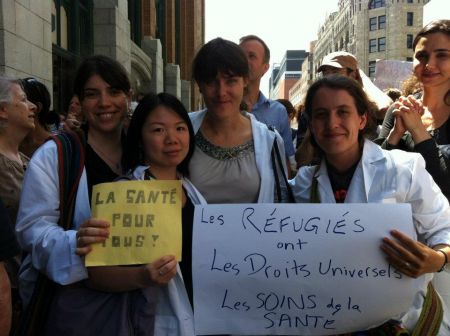Several hundred people gathered at the offices of Citizenship and Immigration Canada in downtown Montreal on June 18 to protest the cuts to the Interim Federal Health Program (IFHP), the program that provides temporary health insurance for refugees, asylum seekers, and certain other migrants. This rally was part of a National Day of Action, with other protests planned for other major cities including Vancouver, Calgary, Winnipeg, Toronto, and Ottawa. Major federal and provincial organizations have all registered their condemnation of the planned cuts and the ways in which they will have serious detrimental effects on the health of thousands of individuals, adults and children alike.
The particularly mean-spirited changes to the IFHP, which took effect on 30 June, will have both general and specific impacts, coming as they do in the wake of other changes in Canadian immigration policy. For example, via Bill C-31, these laws distinguish between migrants from what will be deemed “safe” countries (“designated countries of origin” in government-speak) and those seeking asylum who come from “non-designated” countries. Putting aside for the moment the completely arbitrary way in which countries will be differentiated – and who will determine what is “safe” or not – the cuts will mean that no one is covered for vision, psychological, or dental care. But that’s just the start.
Migrants from “safe/designated” countries will not have a right to ANY coverage for medical care, even for urgent or essential health problems unless there may be public health concerns because the person has a contagious disease or because the person might be a risk to others (e.g., if she or he has certain psychiatric conditions.) This complete withdrawal of insured care also will apply to refugees whose claims for protection in Canada have been rejected and to persons without status.
For all other refugee claimants, that is those coming from countries not designated as safe, as well as persons who are accepted or privately sponsored as refugees, some very minimal care will be covered. This will be limited to that which is considered “urgent or essential” care but will not include any medications necessary to treat these conditions unless, again, drugs to bring the condition under control are needed for public health purposes.
Draconian is perhaps an understatement to describe how serious these cuts in health insurance may be. For those coming to Canada from “designated/safe” countries, there will be no right for pregnant women to give birth in a hospital (or obtain prenatal care); no hospital care for anyone having cancer, a heart attack, or injured in a traffic accident; no medication for children (or adults) who need medication to manage asthma, diabetes, or other serious chronic conditions. And these are but obvious examples.
Community groups working with migrants, physicians, nurses, midwives, and their allies all recognize the discriminatory, retrogressive, and dangerous nature of the planned cuts, and many speakers at the Montreal rally called on the federal government to withdraw them. They asked for the restoration of access to primary health care based on principles of justice and human rights for highly vulnerable migrants and it is hoped that someone in Ottawa is listening.




